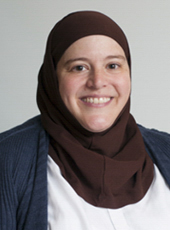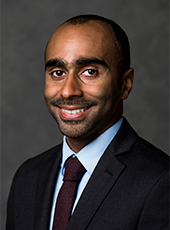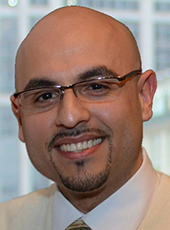Diversity Scholars Initiative

Fatima Cody Stanford, MD, MPH, MPA, MBA, FAAP, FACP, FTOS
Co-Director, NORCH Diversity Scholars
Dr. Stanford is a fellowship-trained obesity medicine physician at Massachusetts General Hospital (MGH)/ Harvard Medical School (HMS). Dr. Stanford received her BS and MPH from Emory University as a MLK Scholar, her MD from the Medical College of Georgia School of Medicine as a Stoney Scholar, and her MPA from the Harvard Kennedy School of Government as a Zuckerman Fellow in the Harvard Center for Public Leadership. She completed her Obesity Medicine & Nutrition Fellowship at MGH/HMS after completing her internal medicine and pediatrics residency at the University of South Carolina. She has served as a health communications fellow at the Centers for Disease Control and Prevention and as a behavioral sciences intern at the American Cancer Society. Upon completion of her MPH, she received the Gold Congressional Award, the highest honor that Congress bestows upon America’s youth. Dr. Stanford has completed a medicine and media internship at the Discovery Channel. An American Medical Association (AMA) Foundation Leadership Award recipient in 2005, an AMA Paul Ambrose Award for national leadership among resident physicians in 2009, she was selected for the AMA Inspirational Physician Award in 2015. The American College of Physicians (ACP) selected her as the 2013 recipient of the Joseph E. Johnson Leadership Award and the Massachusetts ACP selected her for the Young Leadership Award in 2015. She is the 2017 recipient of the HMS Amos Diversity Award and Massachusetts Medical Society (MMS) Award for Women’s Health. In 2019, she was selected as the Suffolk District Community Clinician of the Year and for the Reducing Health Disparities Award for MMS.

Takara Stanley, MD
Co-Director, NORCH Diversity Scholars
Dr. Stanley is a pediatric endocrinologist and clinical investigator at Massachusetts General Hospital/Harvard Medical School. She has a substantial interest in fostering the careers of trainees and junior faculty. She is the fellowship director for the Pediatric Endocrinology fellowship at MGH, and she is the Pilot and Feasibility Director for the NORCH. Dr. Stanley received her undergraduate training at Harvard and her medical degree from Harvard Medical School, and she completed her residency and fellowship training at Massachusetts General Hospital. Her primary research interest is the interrelationship between body composition and metabolism, with a current focus on nonalcoholic fatty liver disease.
Diversity Scholars 2023-2024

Liliana Aguayo, PhD, MPH
Liliana is a community health researcher committed to the prevention of disparities in cardiovascular disease. Her research uses an intersectionality framework to investigate overlapping social determinantal associated with the early life origins in obesity, diabetes and cardiovascular disease.
Doctor Aguayo completed the Master of Public Health/Doctor of Philosophy in Community Health (MPH/PhD) dual degree at the University of Illinois at Urbana-Champaign as a fellow of the USDA Illinois Transdisciplinary Obesity Prevention Program (I-TOPP). Upon completion of her graduate training, she completed postdoctoral training in cardiovascular epidemiology as a fellow of the American Heart Association at Northwestern University and Ann & Robert H. Lurie Children’s Hospital. She is an experienced qualitative and quantitative researcher with training in mixed methods research; and has extensive skills in bilingual survey research with over 6 years of experience carrying out primary data collection with Mexican and Latinx populations in Mexico and the US.
Dr. Aguayo’s research has been funded by a Research Supplement to Promote Diversity in Health-Related Research from NIH/NIDDK, and the NIH-funded Emory Specialized Center for Research Excellence in Sex Differences (SCORE) pilot Award. Currently, she is the recipient of a Career Development Award from the American Heart Association and the K12 Pediatric and Reproductive Environmental Health Scholars-Southeastern Environmental Exposures and Disparities mentored career development program (PREHS-SEED) award from the NIH/NIEHS. In addition, she is the Principal Investigator of Little Hearts/ Corazoncitos, a cohort study among kindergarten aged Mexican children funded by Rollins School of Public Health Dean’s Pilot and Innovation Grant awarded to her.

Eftitan Akam, PhD, RD
Dr. Eftitan (Efi) Akam is an internist/pediatrician and aspiring public health practitioner. Her professional interests are in the intersection of health equity, climate change, and environmental justice. Dr. Akam’s focus is understanding mitigating the impacts of climate change in chronic medical conditions within historically marginalized communities.
In addition to the above, Dr. Akam is passionate about outreach and advocacy. She is the co-founder of Melanated and Dedicated (MaD) Scientist, an outreach program to foster STEM identities in historically under-represented children.
Dr. Akam received her BA from Harvard College, her MD from Vanderbilt University School of Medicine, and her MPH from Harvard University T.H. Chan School of Public Health. She completed her Med-Peds residency at the Massachusetts General Hospital, where she served as Chief Resident. in 2023, Dr. Akam completed a Commonwealth Fund Fellowship in Minority Health Policy at Harvard University. Dr. Akam will be joining Boston University School of Medicine as an Assistant Professor of Medicine and Boston Medical Center as a Med-Peds hospitalist.
Outside of the hospital, Dr. Akam loves to bike, camp, read, and paint.

Stephanie Allende-Richter, MD
Dr. Allende-Richter received her medical degree from the Catholic University of Louvain in Belgium before moving to Boston, where she completed her residency in pediatrics at the Boston Floating Hospital for Children at Tufts University. She is currently a practicing Pediatrician at the Boston Children’s Hospital and an Assistant Professor at the Harvard Medical School. Her patient care experiences are key to her work with trainees as well as the development of clinical innovations aimed at exploring new strategies to promote patient engagement to improve healthcare access and outcome for underserved youths in the US and in resource-constrained countries, notably Haiti and Rwanda.
Dr. Allende-Richter’s area of research interests includes but are not limited to: Health Care Transition, Decision Science to support an informed decision-making process, and understanding the role of the lived environment in the outcome of extreme BMI value among adolescents and young adults with low socio-economic status.
In 2019, she received the Boston Children’s Hospital Medical Staff Organization Faculty Innovated Research Award. She is currently the recipient of a T32 research training grant that supports her clinical research training and career and a Master of Public Health degree.
Dr. Allende-Richter was involved in the Haitian humanitarian relief effort post-earthquake in 2010. She is also involved in her department and hospital’s Global health collaboration with the Ministry of Health in Rwanda in teaching activities.
In her spare time, she enjoys swimming, yoga, gardening, traveling abroad, and listening to a good podcast while making dinner for her two children and her husband.

Kristal Brown, PhD, MSPH
Dr. Kristal Lyn Brown is a black woman and activist born and raised in the USA. She is currently finishing her final year of her postdoctoral fellowship in the Division of General Internal Medicine at the Johns Hopkins University School of Medicine. Dr. Brown graduated from North Carolina Agricultural & Technical State University with a B.S in Biology pre-med. She received her Master of science in public Health (MSPH) from Meharry Medical College in Nashville, Tennessee before completing her PhD in social and behavioral sciences from Virginia Commonwealth University in 2020. Dr. Brown has received several scholarly awards with the most recent being the Society of Behavioral Medicine Health Equity SIG’s Early Career Award, which recognizes individuals at the early career stage who have made significant contributions to evidence-based research, policy, or practice focused on health equity promotion in behavioral medicine.
By training Dr. Brown is an interdisciplinary health equity scholar—her work sits at the intersection of stress, obesity, and disordered eating. She uses mixed methods and behavioral clinical trials to make lifestyle interventions more equitable. Dr. Brown has two focus areas under the umbrella of improving interventions in service of health equity: 1) Identifying novel targets and 2) intervention adaptions. In her first area of research, she examines the role of exposure to racism, racial identity, and other contextual factors related to cardiovascular/cardiometabolic health. In her second focus area, she explores ways in which to adapt interventions in service of health equity. Dr. Brown believes in using art to connect, share, heal and build with the local community. As such, she is the visionary and storyteller of Brown Girl Narratives—a qualitative project focused on the lived experiences of Black women residing in Richmond, Virginia, which culminated with a 60ft mural. In addition to being an interdisciplinary health equity scholar, Dr. Brown is a national board eligible health and wellness coach. She delivers group-based coaching over technology-based platforms both in research and clinical care settings.
Dr. Brown will start a Tenure-Track Assistant Professor position July 2023 at Drexel University College of Nursing and Health Professions, with a secondary appointment in the Dornsife School of Public Health.

Symielle Gaston, PhD, MPH
Dr. Symielle Gaston is a Staff Scientist for the Social and Environmental Determinants of Health Equity Group in the Epidemiology Branch within the Intramural Research Division of the National Institute of Environmental Health Sciences (NIEHS). She investigates social conditions and exposure to environmental hazards as upstream contributors to disparities in health behaviors and cardiometabolic dysfunction. She is particularly interested in understanding the structural determinants of poor sleep health among the most disproportionately impacted health disparities populations. Ultimately, her goal is to use her research to inform interventions designed to eliminate sleep and cardiometabolic health disparities.
Dr. Gaston earned a B.S. in Psychology from Xavier University of Louisiana and both her M.P.H. and Ph.D. from Louisiana State University Health Sciences Center. She completed postdoctoral training as an ORISE Postdoctoral Participant at the U.S. Environmental Protection Agency and as an Intramural Research Training Award Fellow at the NIEHS. During her training, she received awards for outstanding research, including the Fellows Award for Research Excellence and the William G. Coleman Minority Health and Health Disparities Research Innovation Award.

Juan Matute, MD
Dr. Matute is a neonatologist and mucosal immunologist at Massachusetts General Hospital (MGH). He obtained his Medical Degree from La Universidad de Antioquia (Colombia). Prior to his pediatric internship, he engaged in basic immunology research at Indiana University. Subsequently, he completed his pediatric residency through the Boston Combined Residency Program, receiving training at Boston Children’s Hospital (Harvard Medical School) and Boston Medical Center (Boston University School of Medicine). He further specialized in Perinatal and Neonatal Medicine through the Harvard Combined Program, which included training at MGH, Boston Children’s Hospital, Brigham and Women’s Hospital, and Beth Israel Deaconess Medical Center.
Following his clinical training, Dr. Matute joined MGH and Harvard Medical School HMS as an instructor. He currently dedicates his time to mucosal immunology research and clinical care in the MGH Neonatal Intensive Care Unit. Additionally, he leads initiatives focused on optimizing neonatal gastrointestinal health and serves as the Director of Equity in the Division of Newborn Medicine at MGH. Dr. Matute has conducted extensive research on the host-microbiota interface starting in early life, with a specific focus on its implications for homeostasis, the pathogenesis of intestinal inflammation and obesity. His work has received support from the American Heart Association, the Pediatric Scientist Development Program, the Crohn’s and Colitis Foundation, the Harvard Digestive Disease Center, the COURAGE program and the Nutrition Research Center at Harvard.

Brandon Osborn, PhD
Dr. Brandon Osborn is an NIDDK T32 Postdoctoral Fellow in Nutrition Research in the Section of Nutrition—Department of Pediatrics at the University of Colorado—Anschutz Medical Campus. His current research examines social and nutritional epidemiology, cardiometabolic outcomes among Latinos, and the development of culturally inclusive interventions that increase diet quality and prevent adiposity and insulin resistance among children and adolescents that live in households with material need insecurities.
For his dissertation research, he examined the relationship between food insecurity and type 2 diabetes among Latino adults. Prior to his graduate studies, he worked at the Center for Health Equity Research in California and coordinated a Mobile Food Pantry at a Federally Qualified Health Center. Osborn has also worked in the private sector where he has been responsible for designing research and evaluation studies as well as training and assisting with program analysis, reporting, implementation, and evaluation of over 35 federally-funded public health projects.
Osborn is a first-generation college graduate and former Pell Grant Recipient. Osborn is biracial and Latino and his lived experiences of observing health disparities within his own family influences his passion to advance health equity. Osborn received his Ph.D. in Public Health—Disease Prevention at the University of California, Irvine. He earned a Bachelor of Science in health science from California State University, Long Beach.

Stephanie Waldrop, MD, MPH
Dr. Waldrop is an Instructor/Research Fellow in the Department of Pediatrics, Section of Nutrition at the University of Colorado – Anschutz Medical Center, supported by the Ruth L. Kirschstein National Research Service Award T32 Research Fellowship in Nutrition at the University of Colorado – Anschutz Medical Campus (CU – Anschutz). She received her BS in Natural Sciences-Public Health from Johns Hopkins University, her MPH from the University of Alabama- Birmingham and her MD from Wayne State University School of Medicine. She completed her pediatric residency at Morehouse School of Medicine.
Her research interest is in understanding the interactions of nutrition, maternal intrauterine exposures, and epigenetics on obesity risk in childhood. She aims to critically identify and assess the most optimal nutritional strategies for children at high risk of obesity and associated co-morbidities in the context of their interaction with genetic predisposition, susceptibility conferred via intrauterine exposures, and their effects on infant and child growth. Her interests lie in understanding how the totality of these exposures and potential predictors can be moderated by evidence based nutritional interventions established earlier in life and sustained throughout the life course.
Diversity Scholars 2022-2023

Loneke Blackman Carr, Phd, RD
Dr. Blackman Carr is an assistant Professor of Community and Public Health Nutrition at the University of Connecticut. Her expertise is in behavioral weight control interventions and obesity health disparities with a focus on developing more effective intervention for black women. She investigates the context surrounding dietary and physical activity behaviors targeted in weight control interventions, including sociocultural factors that influence daily behavioral engagement. Dr. Blackman Carr’s research interests also include understanding physical activity participation among black women, given the cardiovascular benefit independent of weight status. Her work has been funded internally and externally through the Academy of Nutrition and Dietetics, the United States Department of Agriculture, and the National Heart, Lung, and Blood Institute (NIH).
She earned a B.S. in Nutrition Science from Cornell University, a M.A. in Nutrition from Syracuse University, and her Ph.D. in Nutrition Intervention & Policy from the Gillings School of Global Public Health at the University of North Carolina at Chapel Hill. Dr. Blackman Carr completed postdoctoral training at the Samuel DuBois Cook Center on Social Equity at Duke University. She has been a registered dietitian since 2010, trained at Cornell University.

Mechelle Claridy, PhD, MPH
Dr. Mechelle Claridy is an Epidemic Intelligence Service (EIS) Officer for the Division of Reproductive Health within the National Center for Chronic Disease Prevention and Health Promotion at the Centers for Disease Control and Prevention. She works on the Maternal and Child Health Epidemiology Program Team within the Field Support Branch. Her research interests include health disparities, chronic diseases (obesity and cardiovascular diseases), and maternal and child health. She is particularly interested in advancing the quality of maternal and child health data and using this data to advance policy that addresses maternal health inequities and improves maternal health outcomes.
Dr. Claridy received her BS in Biology from Spellman College, her MPH in Epidemiology from Morehouse School of Medicine, and her PhD in Epidemiology and Biostatistics from the University of Georgia. Dr. Claridy is also part of the research workgroup for the Black Mamas Matter Alliance. Before joining EIS, Dr. Claridy was a Teaching and Research Associate at Morehouse School of Medicine.
Her dissertation research focused on identifying structural factors and their association with severe maternal morbidity and maternal mortality. She has also done interdiscilinary research in epidemiology and obesity where her research focused on pharmacotherapy and weight status in pediatrics, pharmacotherapy trends for treatment of obesity, and pharmacotherapy for obesity among adults with disabilities. During her graduate tenure, she was also a Puerto Rico Testsite to Explore Contamination Threat (PROTECT) Trainee, which was funded by the National Institute of Environmental Health Sciences Superfund Research Program, where she examine environmental exposures and their impact on maternal and child health outcomes.

Awab Ali Ibrahim, MD
Dr. Ibrahim was born in Sudan and lived all over the world. He finished medical school training at Weill Cornell in Qatar before doing his residency and chief residency at the University of South Alabama in Mobile. He is currently a third-year pediatric gastroenterology fellow at the Massachusetts General Hospital/Harvard Medical School. Dr. Ibrahim is also a board member of Project Bread, a hunger fighting non-profit in Massachusetts where is is helping to establish systemic solutions to hunger. This includes efforts in passing a state bill for universal school meals in Massachusetts. Dr. Ibrahim is also involved in establishing a school farming program in his home country of Sudan to help provide school children with at least one free meal a day. His other clinical and research interest include bariatric endoscopy, food as medicine, and obesity.
Dr. Ibrahim is the recipient of several teaching awards by both residents and medical students. Outside the hospital, Dr. Ibrahim is a competitive natural bodybuilder, powerlifter, car enthusiasts, and dog lover.

Veronica Johnson, MD
Veronica R. Johnson, MD is an obesity medicine physician and Assistant Professor in the Department of Medicine, Division of General Internal Medicine at Northwestern University Feinberg School of Medicine. Her research interests include health care disparities in obesity management, treatment of obesity in pediatrics, adolescents and adults and integration of obesity in primary care.
Dr. Johnson received her BS in Biopsychology and Cognitive Sciences from the University of Michigan in Ann Arbor and her MD from the University of Illinois in Chicago (UIC) where she participated in the Urban Medicine program and was elected to the Gold Humanism Honor Society. Dr. Johnson completed her residency training in Internal Medicine and Pediatrics at Tulane University and fellowship in Clinical Obesity Medicine and Metabolism at University of Texas at Houston McGovern Medical School. She is board certified in internal medicine, pediatrics and obesity medicine and currently sees patients at the Center of Lifestyle Medicine at Northwestern Medicine.

Tashara Leak, PhD, RD
Tashara M. Leak, PhD, RD is an Assistant Professor in the DIvision of Nutritional Sciences at Cornell University and in the Division of General Internal Medicine at Weil Cornell Medicine. As a nutririon scientist and health-equity researcher, she designs culturally inclusive, theory-informed interventions to improve diet and obesity among adolescents from racial/ethnic minoritized and low-income backgrounds. She conducts interventions in a variety of settings in New York City (NYC) where adolescents engage in health behaviors (i.e., schools, clinics, and community centers). She has intramural and extramural funding, including grants from the U.S. Department of Agriculture and the National Institutes of Health.
Additionally, Dr. Leak is c0-director of the Cornell Action Research Collaborative (ARC). The aim of ARC is to provide infrastructure for researchers, community organizations, and policy makers to collaborate on pressing soceity issues impacting marginalized communities (e.g., food and housing insecurity).
Adebowale Odulana, MD, MPH

Michelle Ogunwole, MD, PhD
Dr. Michelle Ogunwole, MD, PhD is an Assistant professor of Medicine in the Division of General Internal Medicine at The Johns Hopkins University School of Medicine. She received her BA in Economics from Emory University, her MD from the University of Texas Health Science Center at San Antonio, and her PhD from The Johns Hopkins Bloomberg School of Public Health. She has advanced training in quality improvement and patient safety education and implementation. In 2020 Dr. Ogunwole was selected a a National minority Quality Forum 40 Under 40 Leader in Minority Health.
Dr. Ogunwole is a health disparities researcher and social epidemiologist focused on reducing racial disparities in maternal health outcomes among Black women. She is triple board-certified in internal medicine, obesity medicine, and lifestyle medicine. Her clinical and research agenda are focused on novel clinical models for postpartum women with obesity, postpartum chronic disease, and long-term health outcomes related to complications of pregnancy, particularly for women with gestational diabetes, hypertensive disorders of pregnancy, or excessive gestational weight gain. She is also interested in addressing structural inequities that perpetuate obesity-related pregnancy disparities. She envisions a world where Black women can experience the sacredness of their births and can safely enter pregnancy and emerge whole and well.

Joni Roberts, DrPH, CHES
Joni Roberts, DrPh, CHES, is a certified health education specialist with research interests in maternal and child health and global health issues surrounding the preconception, conception, and post-partum periods of a woman’s life. She received her educational training from Washington Adventist University (BS Political Science), American University (MAT Elementary Education), and Loma Linda University (DrPH Health Education). Her journey to public health was not a straight path, but her interest in women’s health began with her health issues which she later realized applied to other women of color. Her current focus is studying the connections between sexual health and obesity, particularly its connection to sexual activity and contraceptive use. Dr. Roberts frequently volunteers for professional organizations locally and internationally, reflecting her passion for community engagement. She is an enthusiastic participant in cross-cultural work that changes perspectives and improves women’s lives globally.

Shanna Tucker, MD
Dr. Shanna Tucker is a clinical assistant professor at the NYU Grossman School of Medicine. She obtained her medical degreed from Harvard Medical School and completed her internal medicine residency in Primary Care Track at New York Presbyterian-Weil Cornel. Early on in her medical career journey, Dr. Tucker developed a strong passion for preventative medicine, Primary Care, and lifestyle medicine and promotes healthy living for all of her patients. After finishing residency, she completed an Obesity Medicine fellowship at NYU Langone.
Dr. Tucker currently manages a panel of patients for primary care and sees patients for weight management consultations. She also precepts medical students during her clinical time and enjoys teaching students how to incorporate effective counseling on healthy lifestyle habits in primary care. In her research studies, she is conducting a research project that aims to understand the demographic, psychosocial/social, and medical factors that may determine whether patients referred to bariatric surgery undergo surgery or not. Additionally, she is involved in NAFLD research investigating whether there is any degree of steatosis using Vibration Controlled Transient Elastography (VCTE) (e.g. Fibroscan) in patients with metabolic syndrome in the primary care setting.

Tiffani Bell Washington, MD
Dr. Bell Washington is a Quadruple Board Certified Physician who specializes in Adult Psychiatry, Child and Adolescent Psychiatry, Lifestyle medicine, and Obesity Medicine. In 2020, Dr. Bell Washington received the Outstanding Teaching Faculty of the Year Award in Child and Adolescent Psychiatry at Wake Forest School of Medicine and National Medical Association’s Post-Graduate Section’s “Top Physician under 40” Emerging Leader Award.
Dr. Bell Washington is currently a graduate student at Harvard T.H. Chan and graduated May 2022 with an MPH in Health Policy. She completed undergraduate education at Norfolk State University (a Historically Black College and University), medical school at Medical College of Virginia, and residency and fellowship at Wake Forest School of Medicine. She has worked in academic medicine as an Assistant Professor and has held leadership positions in several national organizations including; currently serving as a Delegate from the American Psychiatric Association to American Medical Association Young Physicians’ Section, AMA ambassador leadership steering committee for the past two years, and as an executive member on several national organizations such as the Black Psychiatrists of America (501c3), Council of Black Obesity Physicians and African American Wellness Project (501c3). She also was selected to serve as an APA SAMHSA Fellow and on the American Medical Association’s Minority Affairs Section, Governing Council.
Dr. Bell Washington is passionate about advocacy, research, improving diversity and equity in leadership and decreasing stigma and bias surrounding chronic illnesses such as mental health disorders and obesity. Prior to moving to Boston for graduate school and despite being a full-time student, Dr. Bell Washington currently works in her private practice, The Healthy Weight MD PLLC, which focuses on prioritizing stress management, lifestyle medicine, mental health, and obesity treatment. She also works with marginalized communities in correctional psychiatry with Centurion Health.
Lastly, Dr. Bell values being well-rounded and strongly encourages self-care. She is a wife and mother of 4 children under 5 years old. She enjoys dancing, hiking, journaling, spending time with family and participating in community outreach with her sorority Delta Sigma Theta Sorority, Incorporate.
Diversity Scholars 2021-2022

Chika Anekwe, MD, MPH
Chika V. Anekwe, MD, MPH is an obesity medicine physician at Massachusetts General
Hospital (MGH) and Instructor in Medicine at Harvard Medical School (HMS). Dr. Anekwe
received her Bachelor of Arts in Molecular Biology from Princeton University, her MD from
the University of Connecticut School of Medicine, and her MPH from Columbia University.
She was a Jackie Robinson Foundation Scholar for both her undergraduate and graduate
studies, and 2006-2007 Princeton Project 55 Public Interest Fellow. Dr. Anekwe completed
her internship in Pediatrics at NYU Langone Medical Center/Bellevue Hospital, and went on
to complete her residency in General Preventive Medicine and Public Health at SUNY Stony
Brook University Medical Center. Before joining MGH/HMS in August 2018, Dr. Anekwe
was a staff physician at Long Island Weight Loss Institute, the largest private obesity medicine
practice in Long Island, NY. Dr. Anekwe’s professional interests are in the areas of clinical
nutrition, obesity, non-surgical weight management, health policy and community health
outreach, with a special interest in underserved communities. In fall 2021, Dr. Anekwe will be
joining Newton-Wellesley Hospital, an affiliate of Mass General Brigham, as medical director
of the Center for Weight Loss Surgery. She is looking forward to building the medical
management component of obesity treatment in the community hospital setting, in addition to
continuing to engage in clinical, research and teaching endeavors at MGH/HMS.
Maxine Ashby-Thompson

Rita Brookheart, PhD
Dr. Brookheart is an Assistant Professor of Medicine in the Division of Geriatrics and Nutritional Science at Washington University School of Medicine. She graduated from Sweet Briar College magna cum laude with a B.A. in biology and was inducted into Phi Beta Kappa. Dr. Brookheart received her PhD from Washington University where she was awarded an NIH NRSA F31 Individual Predoctoral Fellowship and completed a postdoc at the Johns Hopkins School of Medicine, where she received an NIH NRSA F32 Individual Postdoctoral Fellowship. As a faculty member at Washington University, Dr. Brookheart has been awarded several grants in support of her research including an NIH Building Interdisciplinary Research Careers in Women’s Health (BIRCWH) K12 Award, an NIH-NHLBI K01 Career Development Award, and a Washington University NORC Pilot and Feasibility Award.
A primary focus of Dr. Brookheart’s lab is to use both basic and translational approaches to identify key molecular regulators of skeletal muscle metabolism and to elucidate the influences these genes have on muscle metabolism and function and energy expenditure in the context of obesity.

Karla Kendrick, MD
Dr. Karla Kendrick is a general medicine fellow at Beth Israel Deaconess Medical Center. Her research interests include health disparities and health behaviors related to obesity and cardiovascular disease. She is particularly interested in interventions to improve health behaviors and prevent serious illness, especially among underserved and vulnerable groups. She is the 2021 recipient of the Founders’ Grant from the Society of General Internal Medicine, which supports research by a junior investigator, for a project to improve physical activity among young adults with obesity.
Dr. Kendrick is originally from Washington, DC. She went to the University of Pittsburgh for college, where she received a BS in Biological Science. After working as an HIV and health educator within the corrections system in Washington, DC for a year, she completed medical school at the University of Pittsburgh and an Internal Medicine residency at Johns Hopkins Bayview Medical Center. She is also currently an MPH candidate at the Harvard School of Public Health.

Samantha Martin, PhD
Dr. Martin is a postdoctoral fellow at the University of Alabama at Birmingham (UAB) in the Department of Nutrition Sciences. She received two BS degrees (Biology and Chemistry) from Mississippi Valley State University as a Louis Stokes Alliances for Minority Participation (LSAMP) Scholar, and her PhD from UAB as a Bridge to Doctorate (BD) Trainee, and Comprehensive Minority Faculty and Student Development (CMFSD) Fellow. During her graduate tenure, her research focused on identifying dietary phytochemicals that mediate epigenetic regulation. At the completion of her final year as a PhD candidate, she developed an intense passion for translational research and clinical studies. She then went on to become the first American Heart Association (AHA) Strategically Focused Research Network postdoctoral fellow at UAB. Her research as an AHA fellow focused on identifying mechanisms associated with the intergenerational transmission of obesity and cardiometabolic disease. Building on this experience, she is now a Mechanisms of Hypertension T32 fellow focused on using pregnancy to identify mechanisms and strategies that prevent cardiovascular disease in future generations. She is known to her colleagues as “Dr. Congeniality” (a title she received from a campus-wide vote by UAB’s postdoctoral office), and enjoys spending time with family, traveling, and being married to her sweet husband, Jon.

Raziel Rojas-Rodriguez, PhD
Dr. Rojas-Rodriguez is a postdoctoral research fellow in the Mother Infant Research Institute at Tufts Medical Center, working under the mentorship of Dr. Patrick Catalano and Dr. Andrew Greenberg. She is part of the research team of the Lifestyle Intervention in Preparation for Pregnancy (LIPP) clinical trial, which focus is to promote weight loss before a planned pregnancy in overweight/obese women to improve maternal metabolism and reduce neonatal adiposity. Dr. Rojas-Rodriguez’s study investigates the longitudinal effects of the pregravid lifestyle intervention on maternal adipose tissue lipid metabolism. In addition to the maternal studies, her project examines if the maternal pregravid intervention can beneficially impact the metabolic programming of umbilical cord mesenchymal stem cells. Dr. Rojas-Rodriguez research interests are centered on the adaptations of maternal metabolism during pregnancy, gestational diabetes, maternal obesity, neonatal adiposity, adipose tissue physiology, and adipogenesis of mesenchymal stem cells.
Raziel completed her BS at the Interamerican University of Puerto Rico at Arecibo. As an undergraduate, she participated in the NSF Undergraduate Research Mentoring Program (NSF-URM) at the University of Puerto Rico Medical Sciences Campus, where she worked with Dr. Steven Treistman. In 2019, she received her PhD degree from the University of Massachusetts Medical School (UMMS). Under the thesis mentorship of Dr. Silvia Corvera, Raziel conducted human studies and utilized animal models to investigate the physiology of adipose tissue during pregnancy and its relationship with the development of gestational diabetes.
Dr. Rojas-Rodriguez’s awards include the 2011 Chancellor’s Medal from the Interamerican University of Puerto Rico at Arecibo. As a PhD student, she was a scholar of the UMMS Initiative for Maximizing Student Development and received recognition for student community service. In addition, Dr. Rojas-Rodriguez was a co-founder and board member of the SACNAS-UMMS Student Chapter. As a postdoctoral research fellow, Dr. Rojas Rodriguez was awarded a Kirschstein-NRSA postdoctoral fellowship (F32) through the NICHD and is a Scholar from the Tufts University IRACDA program (K12).
Dr. Rojas-Rodriguez is the Boston NORC postdoctoral representative of the Trans-NORC effort to increase the representation and provide support to scientists from underrepresented groups conducting research in nutrition, obesity, and related conditions. Besides conducting her research and advocating for equal student development opportunities in diverse populations, Raziel enjoys teaching and mentoring the next generation of scientists. Her career goals are focused on continuing translational research in maternal metabolism and establishing a bridge research training program for students in Puerto Rico.

Glenn Rowe, PhD
Dr. Glenn C. Rowe is an Assistant Professor in the Division of Cardiovascular Disease within the Department of Medicine at the University of Alabama at Birmingham. Dr. Rowe’s research interest focuses on understanding the molecular pathways that influence mitochondrial metabolism in response to diet and exercise, in the context of the metabolic syndrome. The laboratory utilizes a variety of genetic models to dissect the key molecular components to mitochondrial functionality in skeletal and cardiac muscle. Dr. Rowe received his B.S. in Biology from Brandeis University and his M.S. and Ph.D. in Molecular, Cellular and Developmental Biology from Yale University and completed his post-doctoral training at Beth Israel Deaconess Medical Center-Harvard Medical School.
Martine Saint-Cyr

Delisha Stewart, PhD
Dr. Delisha Stewart received a Bachelor of Science degree in Biochemistry in her hometown of Dayton, Ohio from the University of Dayton in 1996. Her Ph.D. was earned at the University of Alabama at Birmingham (UAB) in Biochemistry in 2001. She completed postdoctoral training at the University of Delaware, studying prostate cancer ontology and therapeutic development, then at UAB investigating Notch signaling in osteosarcoma. Following a nearly five-year hiatus from research, she returned to academia and completed a third postdoctoral fellowship at the University of North Carolina at Chapel Hill (UNC-CH) using genomics methodology to study breast cancer microenvironment – immune system crosstalk and the role of inflammation on disease subtype aggressiveness. She completed her training at RTI International, incorporating metabolomics applications to interrogate cancer progression and treatment response outcomes. In 2017, she joined the faculty in the Department of Nutrition at UNC-CH, as an Assistant Professor, working at the Nutrition Research Institute, in Kannapolis, NC. Her research currently focuses on the impact of nutrition on obesity- and inflammation-driving cancer progression, poor treatment responses and health disparity outcomes. The goal of her research is to determine optimal nutritional states that can improve overall cancer patient health, overcome genetic factors that impair treatment efficacy and reverse negative immune impacts in general and to mitigate disparate treatment outcomes ethnically diverse populations.

Ursula White, PhD
Dr. Ursula White is an Assistant Professor in Clinical Science and the Director of the Physiology of Human Adipose Tissue Laboratory at Pennington Biomedical Research Center. Dr. White earned her B.S. degree in Biological Sciences at Louisiana State University- Baton Rouge. As a graduate student, she was a recipient of the LS-LAMP Bridge to the Doctorate Fellowship, supported by the National Science Foundation (NSF), and went on to earn her Ph.D. at LSU.
Dr. White was awarded a National Institutes of Health (NIH)/NIDDK Diversity Health-Related Research Grant Supplement to support her post-doctoral studies. She was then awarded a NIH/NIDDK K01 career development award and a subsequent R03 grant to develop high proficiency as a clinical investigator of human physiology. Dr. White’s research interests include investigating the important functions of adipose (fat) tissue that influence systemic health in humans. She is also interested in how fat distribution and body shape may contribute to the health complications of obesity.
Dr. White is currently the Principal Investigator of an NIH/NIDDK R01 grant to study the dynamics of adipose tissue expansion and metabolism during changes in energy balance (weight gain and loss) and the impact on future metabolic health outcomes in men and women. She has also secured funding from both the Pennington Biomedical/Louisiana Nutrition and Obesity Research Center (NORC) and the Louisiana Clinical and Translational Science Center (LACaTS) Pilot and Feasibility Grants to support her studies. Dr. White remains committed to understanding the triggers and health consequences of obesity and related diseases in order to inform effective prevention and treatment approaches.
In addition to her research projects, Dr. White has served as a grant reviewer for the NIH Clinical and Integrative Diabetes and Obesity (CIDO) Study Section and the Musculoskeletal, Oral and Skin Sciences (MOSS) Integrated Review Group, as well as a member (and Chair) of Track 1 for The Obesity Society Annual Program Committee. She is also a mentor for the NSF LS-PAC-MODELS program, which works to support recruitment, training, and retention of underrepresented minorities in the STEM workforce.
Diversity Scholars 2020-2021

Frankie Heyward, PhD
Dr. Heyward is a postdoctoral research fellow in the endocrinology division at Beth Israel Deaconess Medical Center (BIDMC), where he is working in the lab of Dr. Evan Rosen. His primary research involves the use of various cell-type specific high-throughput sequencing, and genetic engineering, approaches to identify transcriptional regulators involved in the neuronal control of energy homeostasis in mice. Dr. Heyward’s general research interests include the neuroepigenetic mechanisms underlying the obesity-induced body-weight dysregulation, as well as obesity-induced cognitive and neuropsychiatric dysregulation.
Dr. Heyward’s recent awards include an 2018 American Heart Association (AHA) Postdoctoral Fellowship, 2018 Burroughs Wellcome Fund (BWF) Postdoctoral Enrichment Program Fellowship, 2018 American Diabetes Association (ADA) Minority Postdoctoral Fellowship, and 2019 Nutrition and Obesity Research Center of Harvard (NORCH) Pilot and Feasibility Grant for Represented Minorities. In addition to conducting research, Dr. Heyward also established, and serves as the Chair of, the Harvard Medical School Black Postdoctoral Association (HBPA), which seeks to promote a sense of connectedness throughout the HMS black postdoctoral community, while providing a space for the exchange of information and opportunities that will enhance the social wellbeing, research advancement, and professional development of its members.
Dr. Heyward earned his PhD in Neurobiology from the University of Alabama at Birmingham while working with Dr. David Sweatt while studying the epigenetic basis of obesity-induced cognitive impairment. During this time he earned the UAB Nutrition and Obesity Research Center (NORC) Pre-doctoral Kirschstein-NRSA T32 Fellowship, UNCF/Merck Graduate Science Research Dissertation Fellowship, Comprehensive Minority Faculty and Student Development Program Fellowship, and Network of Minority Health Research Investigators (NMRI) Excellence in Research Award (Basic Science).

Mary Frances Lopez, PhD
Dr. Mary Frances Lopez is an Assistant Professor of Pediatrics with joint appointments at the Endocrine Division in the Boston Children’s Hospital and the Harvard Medical School. Dr. Lopez earned her Ph.D. from the University of California Santa Cruz and trained as a post-doctoral fellow in the Neurology Department at Boston Children’s Hospital, where she received a Ford Foundation Postdoctoral Fellowship sponsored by the National Academies of Sciences Engineering and Medicine.
Her research interests include studying the effect of insulin-like growth factors in neonatal growth, nutrition, and metabolism. Recently, the main focus of her research has involved studying the mechanisms by which neuronal circuits regulate body weight and identifying those interactions that contribute to obesity.
One of her passions includes mentoring students and postdoctoral fellows. She currently serves as a Faculty Advisor and mentor for a variety of training programs ranging from K-12 through postdoctoral education at the HMS Office of Diversity Inclusion and Community Partnerships.
Dr. Lopez was awarded a Harvard Medical School Scholars in Medicine Award for Faculty Development. She has also received the Harold Amos Faculty Diversity Award for her efforts in moving the Harvard Medical School towards being a more diverse and inclusive community.

Carmen Monthe-Dreze, MD
Dr. Monthé-Drèze is a Neonatologist and researcher at the Brigham and Women’s Hospital and an Instructor of Pediatrics at Harvard Medical School. She received her MD degree from Albert Einstein College of Medicine and completed her pediatric residency at the Harvard Boston Combined Residency Program. She served as a Neonatal ICU Hospitalist for two years before completing her fellowship at the Harvard Neonatal-Perinatal Medicine program, where she served as Chief Fellow. Throughout her medical training to become a neonatologist, Dr. Monthé-Drèze appreciated how maternal health in pregnancy could impact offspring health throughout its life course. Her academic focus therefore has evolved to elucidate early (including prenatal) life modifiable determinants of child outcomes. In light of the rising prevalence of pediatric obesity and associated health burden, Dr. Monthé-Drèze seeks to provide novel insights onto the developmental origins of child obesity and inform future intervention studies. Specifically, her research focuses on 1) Understanding the role of maternal gravid factors (obesity, nutrition, diabetes, dysmetabolism) on the development of child behavior, cognition and obesity and 2) Elucidating the relationship of child neurodevelopmental processes and biobehavioral pathways early in preschool years to the subsequent development of pediatric obesity. Outside of work, Dr. Monthé-Drèze enjoys spending time with her husband and daughters.

Todd Reid, ScD, MBA, MPH, MSc
Todd Reid, ScD, MBA, MPH, MSc is an Epidemiologist, Technologist, Entrepreneur, and Research Associate at Harvard T. H. Chan School of Public Health and at the Massachusetts Institute of Technology (MIT) Media Lab.
Dr. Reid’s research focuses on integrating technology and innovation into health and the design and development of longitudinal epidemiological cohort studies and interventions that leverage big data. He co-authored the “Big Data and Health” report of the World Innovation Summit on Health (WISH) in Doha, Qatar, has taught courses on “Data Driven Health” in the Media Arts and Sciences department of the MIT Media Lab, and has been faculty at Massachusetts General Hospital’s Center for Assessment Technologies and Continuous Health (CATCH), designing interventions that use wireless technology to enable continuous behavioral monitoring for chronic disease management.
Dr. Reid also serves as a research scientist and executive committee member of the Africa/Harvard T. H. Chan School of Public Health Partnership for Cohort Research and Training (PaCT), a four-nation longitudinal cohort study with plans to enroll 500,000 people to investigate Africa’s “epidemiological transition”—the shift to chronic ailments. Dr. Reid is an executive steering committee member of the Global Cohort Initiative (GCI), a multi-institutional consortium that will comprise over 3.5 million study participants from which longitudinal “Big Data” on behavior and health status will be collected and assessed continuously. Dr. Reid and his team members are recent recipients of Harvard University’s Star-Friedman Challenge and the Chan School’s Dean Fund for Scientific Advancement to study COVID related outcomes in Healthcare workers and disadvantaged youth. His start-up entrepreneurial ventures focus on the use of innovative tools to educate the public on healthy dietary behaviors and understanding complex nutrition science.
Dr. Reid trained and worked for over a decade on cohort studies at Harvard Medical School, including the Nurses’ Health Studies (NHS). He holds a doctorate from the Harvard School of Public Health, an MPH and an MSc from Harvard University and an MBA from MIT’s Sloan School of Management. He earned a BA in Biology from UNC-Chapel Hill.
You can read more about his research and projects here:
https://connection.mit.edu/todd-reid-scd-mph-mba
https://connects.catalyst.harvard.edu/Profiles/display/Person/17250

Mabel Toribio, MD
Dr. Toribio performs clinical research on HIV-associated cardiometabolic disease with a focus on transgender populations.
Dr. Toribio is an Instructor in Medicine at Harvard Medical School and a clinical investigator within the Metabolism Unit at Massachusetts General Hospital (MGH). Dr. Toribio received her undergraduate degree (summa cum laude) from Duke University and her MD from the Johns Hopkins University School of Medicine. After finishing her internal medicine training at the University of California, San Francisco, Dr. Toribio completed her Endocrinology training at Massachusetts General Hospital.
Dr. Toribio’s research focuses on HIV-associated cardiometabolic disease with a specific focus on transgender populations which are disproportionately burdened by HIV-infection. With her research, Dr. Toribio hopes to optimize the health of at-risk and vulnerable patient populations such as transgender women living with HIV. Dr. Toribio’s research has been funded by the following awards while at MGH: an NIH NRSA, Harvard Catalyst KL2 Award, Harvard University Center for AIDS Research Career Developmental Core Award, MGH Department of Medicine Sanchez-Ferguson Medical Research Faculty Award, K23 Mentored Patient-Oriented Career Development Research Award, and an American Heart Association – Harold Amos Medical Faculty Development Program Award. In addition to her clinical research, Dr. Toribio is also highly dedicating to training students from underrepresented backgrounds in medicine.

Davene R. Wright, PhD
Davene R. Wright, PhD is faculty in the Department of Population Medicine, a research and academic partnership between the Harvard Pilgrim Health Care Institute and Harvard Medical School. There, she is part of the Center for Healthcare Research in Pediatrics and the Division of Chronic Disease Across the Lifecourse. Until 2019, Dr. Wright was an Assistant Professor in the University of Washington Departments of Pediatrics and Pharmacy.
Dr. Wright received a BS in Polymer and Textile Chemistry from the Georgia Institute of Technology where she was a President’s Scholar and research assistant in the CDC Division of Nutrition, Physical Activity, and Obesity. She earned her PhD in Health Policy and Decision Sciences from Harvard University in 2012 where she was a recipient of the National Science Foundation Graduate Research Fellowship. Dr. Wright is a Trustee of the Society for Medical Decision Making (SMDM), the co-Chair of the SMDM Pediatric Interest Group, is on the Oversight Advisory Committee for the American Heart Association Strategically Focused Children’s Research Network, and is a Statistical and Methods Reviewer for JAMA Network Open. She is a recipient of the Harvard Medical School Diversity, Inclusion, and Community Partnership Faculty Fellowship.
Dr. Wright’s research aims to improve the supply of and demand for efficient health care that can improve the management of pediatric chronic diseases with a focus on childhood obesity. In her work, she utilizes conjoint analysis, economic evaluation, simulation modeling, health services research, and behavioral economic research methods. Dr. Wright’s work has been funded by NIH, the American Heart Association, and the American Diabetes Association. You can find her on Twitter @WrightCensored.
See her bio on her faculty website at https://www.populationmedicine.org/index.php/DWright.
Diversity Scholars 2019-2020

Kofi D. Essel, MD, MPH, FAAP
Dr. Essel is a board-certified community pediatrician at Children’s National Health System in Washington, D.C. Dr. Essel also serves as Assistant Professor of Pediatrics, the Director of the George Washington University School of Medicine’s Community/Urban Health Scholarly Concentration, a Clinical Public Health Mentor, and the Director of the Clinical Public Health Summit on Obesity.
Dr. Essel has dedicated his career to advocacy and research around healthcare training, health disparities, and community engagement, with expertise and national recognition in the areas of addressing obesity and food insecurity in families. He was nationally recognized by the Alliance for a Healthier Generation for helping to create an innovative curriculum to enhance pediatric resident trainee skills on obesity management. He also assisted with developing a national toolkit for pediatric providers to better screen and intervene for food insecurity in their clinical settings with the Food Research & Action Center. He is the Principal Investigator of a large multidisciplinary population health initiative that aims to strengthen community-clinical ties to address obesity in marginalized areas in Washington, D.C. Dr. Essel has received numerous local and national awards for his professional practice, most recently being selected for the Top 40 Under 40 Leaders in Health Award by the National Minority Quality Forum.
Dr. Essel earned a BS from Emory University with a focus on Human Biology and Anthropology, and earned his Medical Degree and Masters in Public Health in Epidemiology from GWU. He completed pediatric residency and General Academic Pediatric fellowship training at Children’s National. Dr. Essel is happily married and has 2 young children that keep him very busy and active.

LaPrincess C. Brewer, MD, MPH, FACC, FASPC, FACP
Dr. Brewer is a cardiologist and Assistant Professor of Medicine within the Mayo Clinic Department of Cardiovascular Medicine in Rochester, MN. She earned her MD at the George Washington University School of Medicine, her MPH from the Johns Hopkins Bloomberg School of Public Health and her BS, magna cum laude in Chemical Engineering from Howard University. She completed Internal Medicine residency training at Johns Hopkins University and clinical fellowships in Cardiovascular Diseases and Preventive Cardiology at Mayo Clinic. Her primary research focus is addressing cardiovascular health disparities through community-based behavioral interventions for cardiovascular disease risk factor modification in racial/ethnic minority populations, particularly African-Americans. She has published on racial differences in weight maintenance among women and psychosocial factors influencing obesity and overall cardiovascular health.
She was awarded highly competitive career development awards including the American Heart Association-Harold Amos Medical Faculty Development Program Award, NIH Building Interdisciplinary Research Careers in Women’s Health (BIRCWH) Scholar Award and the NIH KL2 Mentored Career Development Award to expand her work as a clinical investigator. She is currently principal investigator of the FAITH! (Fostering African-American Improvement in Total Health) trial, a cardiovascular health promotion intervention in partnership with African-American churches. Her research and community engagement initiatives have been recognized by a number of prestigious awards including the 2017 MN Chapter American College of Physicians Volunteerism Award. Her community health advocacy efforts have been featured on both local and national media outlets such as the ABC, CBS, PBS, CNN and the Huffington Post. She was recently named a 2019 ChangeMaker by MN Public Radio News which honored leaders making history in MN to commemorate Black History Month.
You can read more about Dr. Brewer on her faculty bio.

Elvin Thomaseo Burton, PhD, MPH
Dr. Burton is an Assistant Professor of Pediatrics at The University of Tennessee Health Science Center in Memphis, TN. Trained as a psychologist, Dr. Burton’s research seeks to develop and implement high quality behavioral interventions for children, adolescents, and their families with overweight and obesity; he has a particular interest in group-based interventions. He is a member of the Pediatric Obesity program at UTHSC and serves as pediatric psychologist for the Healthy Lifestyle Clinic at Le Bonheur Children’s Hospital. Dr. Burton earned a Ph.D. in clinical psychology from Purdue University as well as an MPH with a focus on community health. He completed postdoctoral training in pediatric obesity at Boston Children’s Hospital / Harvard Medical School.

Michelle Cardel, PhD, M.S., R.D., F.T.O.S.
Dr. Cardel is an assistant professor and obesity and nutrition scientist in the Department of Health Outcomes & Biomedical Informatics at the University of Florida (UF), where she is also an Associate Director for the Center for Integrative Cardiovascular and Metabolic Diseases and founder and director of UF’s Obesity Research Alliance. Her research is focused on characterizing psychosocial factors, including low social status and food insecurity, that contribute to the development of obesity and implementing effective weight loss treatment programs for obesity among underserved populations. Her specialties include nutrition, pediatric and adult obesity, psychosocial factors contributing to obesity, implementation science, and health disparities.
Dr. Cardel is a member of American Society for Nutrition (ASN), and was selected as a Fellow of The Obesity Society for her contributions to the field of obesity. Dr. Cardel has been presented with a variety of awards including the University of Alabama at Birmingham (UAB) Outstanding Woman Award, UAB’s President’s Diversity Award, The Obesity Society’s Ethan Sims Young Investigator Award finalist, UAB’s National Alumni Society Young Alumni Rising Star Award, and the ASN Grand Prize for Young Minority Investigators Award. She has been co-I or PI on several funded obesity grants, including her current NIH K01 career development award.
Dr. Cardel received her bachelor’s degree in biology with a minor in Chemistry at Florida State University and is a registered dietitian. Her master’s degree in clinical nutrition and doctoral degree in Nutrition Sciences was awarded from University of Alabama at Birmingham.
You can read more about Dr. Cardel on her faculty bio.

Tiffany L. Carson, PhD, MPH
Dr. Carson is an Assistant Professor in the Division of Preventive Medicine in the Department of Medicine at the UAB School of Medicine. She is also an Associate Scientist in the UAB Nutrition Obesity Research Center, the Comprehensive Cancer Center, and the Minority Health and Health Disparities Research Center. Dr. Carson is an applied epidemiologist with expertise in the area of psychosocial factors related to obesity such as stress, social support, body image, and quality of life. Dr. Carson’s current research also incorporates biological measures into her investigations to inform a bio-behavioral model for addressing obesity and other health disparities. She has received funding from an NCI Diversity Supplement, additional pilot grant programs , and an NCI-funded K01 award to examine the complex relationships between biological (e.g., cortisol, gut microbiota) and behavioral (e.g., stress, coping, dietary intake) factors and their effects on weight and weight loss among black and white women and men living in the Deep South. Dr. Carson has published in the areas of obesity, diet, physical activity, stress and other psychosocial factors related to obesity in black women.

Adolfo G. Cuevas, PhD
Adolfo G. Cuevas, Ph.D., is a community psychologist and Director of the Psychosocial Determinants of Health (PSDH) Lab at Tufts University. Dr. Cuevas received a Ph.D. in Applied Psychology at Portland State University concentrating in Community Psychology and Research Methods, an MS in Applied Psychology at Portland State University, and a BA in Psychology at City College of New York. He attained additional training as a cancer prevention postdoctoral fellow at the Harvard T.H. Chan School of Public Health (2015-2017). His work primarily focuses on the intersection between race/ethnicity, psychosocial stressors, and obesity. Dr. Cuevas has received funding from the Robert Wood Johnson Foundation and Cancer Disparities Research Network to investigate the biobehavioral pathways linking psychosocial stress and obesity among Hispanics/Latinos and Black Americans. His work has been published in scientific journals such as Health Psychology, Cancer Causes and Control, American Journal of Public Health, and Cardiology Clinics and featured in HuffPost and NPR’s Code Switch. He is the recipient of Tufts CTSI Career Development Award to examine the effects of psychosocial stressors on obesity disparities among middle-aged and older adults. For his research work on race, racism, and health, Dr. Cuevas was selected as one of the National Minority Quality Forum’s 40 Under 40 Leaders in Minority Health.

Angela Fowler-Brown, MD, MPH
Dr. Fowler-Brown is an internist and researcher at Massachusetts Institute of Technology. She received her MD degree from Harvard Medical School and then completed a residency in internal medicine at Massachusetts General Hospital. After residency, Dr. Fowler-Brown served as an officer and staff physician in the US Air Force and subsequently completed a research fellowship and MPH at University of North Carolina at Chapel Hill. Currently, she maintains a busy clinical practice and aims to provide the best care to individuals in her practice. Dr. Fowler-Brown is also motivated by her clinical practice to conduct research to better understand factors that affect health on a broader population level. Her research interests are in understanding how clinicians can help patients to mitigate the adverse impacts of obesity and other chronic disease conditions, particularly in vulnerable populations.

Rameck Hunt, MD
Dr. Hunt is board-certified in both internal medicine and obesity medicine, a clinical researcher on obesity, and founder and medical director of the weight management program at Penn Medicine Princeton Health. In 2015, he was named the New Jersey Hospital Association Healthcare Professional of the Year for his work in obesity medicine. He is the co-founder of The Three Doctors Foundation, which focuses on health, education, leadership, and mentoring. He has been a medical contributor on CNN and was a weekly medical expert on the nationally-syndicated Tom Joyner Morning Radio Show. He has been interviewed on numerous talk shows, including Oprah. He is also an international motivational speaker and also gives lectures around the country on obesity. He and his two doctor friends co-authored The Pact and We Beat the Streets, which both became New York Times bestsellers. Dr. Hunt has a forthcoming book on the treatment of obesity entitled No Guess Work- A Low Carb Approach at Taking the Guess Work Out of Healthy Living that will be released in 2020.
Dr. Hunt received his Bachelor of Science from Seton Hall University. He received his Doctor of Medicine and completed his residency in internal medicine at Rutgers Robert Wood Johnson Medical School. He is also a Clinical Assistant Professor of medicine at Rutgers Robert Wood Johnson Medical School. Dr. Hunt also the chair of the IRB at Penn Medicine Princeton Health.

Chandra L. Jackson, PhD, MS
Dr. Chandra L. Jackson is an Earl Stadtman Investigator who leads the Social and Environmental Determinants of Health Equity group in the Epidemiology Branch of the National Institute of Environmental Health Sciences with a joint appointment in the National Institute on Minority Health and Health Disparities. She earned a Master’s degree in Epidemiology from the Harvard T.H. Chan School of Public Health, a PhD in Epidemiology from The Johns Hopkins Bloomberg School of Public Health, and was an Alonzo Smythe Yerby Postdoctoral Fellow at the Harvard T.H. Chan School of Public Health before becoming a Research Associate in the Harvard Catalyst Clinical and Translational Science Center.
She has certificates in both ‘Health Disparities and Health Inequalities’ as well as ‘Community-based Public Health’ from Johns Hopkins, and is interested in translating epidemiologic evidence into interventions, policies, and practices that improve population health and address health disparities. As a former White House Intern working in both the National Economic and Domestic Policy Councils during the Obama administration, she researched and synthesized public health evidence that informed, for example, program decisions for the First Lady’s Let’s Move! Campaign.
Dr. Jackson’s current research focuses on how the physical and social environments impact disparities in sleep health and subsequent risk of cardiometabolic dysfunction, including obesity. Her research has been presented at national scientific conferences and published in both academic journals like Lancet, JAMA Internal Medicine, and the American Journal of Epidemiology as well as major media outlets like the US News & World Report and The New York Times. She has earned merit-based awards, including the Charlotte Silverman Award for outstanding commitment to public health, policy, and community outreach at Johns Hopkins, an Outstanding Fellows Award at Harvard, and the Presidential Early Career Award for Scientists and Engineers.
You can read more about Dr. Jackson on her faculty bio.

Holly Lofton, MD, DiplABOM
Dr. Holly Lofton started her personal journey of weight loss as a pre-teen when she modified her lifestyle to improve her diet and became more active in sports. Even during her regimented medical school years at the Medical College of Georgia, she enlisted patients and fellow classmates to lead more active lifestyles and to use nutrition to improve their overall health.
Dr. Lofton completed her Internal Medicine residency at Lenox Hill Hospital in Manhattan. She was then hand selected from a pool of many physicians to train at Geisinger Medical Center’s fellowship in Nutrition Support and Obesity, became board certified in Obesity Medicine, and went on to serve as a staff physician and fellowship director at Geisinger.
In recent years, she has served on the bariatric medicine committee for the American Society for Metabolic and Bariatric Surgery as well as on the Board of Directors for the Obesity Action Coalition, all while training other physicians to become skilled in weight management and nutrition. She also educated the general public about the importance of maintaining a normal weight through lectures, workshops, and a national radio segment.
Dr. Lofton was welcomed into the NYU Langone Weight Management Program in early 2012. She designed the popular New You weight loss program to help her patients obtain results while fostering nutrition education and placing emphasis on a healthy lifestyle. She is currently involved in clinical research pertaining to the effects of liraglutide on patients who have regained weight after bariatric surgery, and continues to educate students on diagnosing and treating obesity. She became a founding member of the NYU Comprehensive Program on Obesity and Leads the Education and Clinical Access divisions of the program. She is also the fellowship director of NYU Langone Health’s Clinical Obesity Medicine Fellowship.
You can read more about Dr. Lofton on her faculty bio.

Numa Pompilio Perez, MD
Dr. Perez, is a PGY-5 General Surgery resident at the Massachusetts General Hospital, currently on the 2nd year of a two-year research sabbatical. Dr. Perez’ interest in pediatric obesity and its management emanates from his love for pediatric surgery combined with his passion for solving healthcare disparities. In light of the rising prevalence of pediatric obesity in the United States, and its disproportionate effect on racial minorities, Dr. Perez feels it is our society’s moral duty to invest significant effort and resources into providing children and adolescents who suffer from obesity equitable access to a multidisciplinary approach to treatment, while ultimately tailoring our therapy to their specific circumstances, supported always by objective data. In parallel, we must work towards identifying effective methods for primary prevention of pediatric and adult obesity, while promoting a healthy lifestyle and prolonged health span for all individuals, regardless of class or socioeconomic status.
During his research sabbatical, Dr. Perez works at the Codman Center for Clinical Effectiveness in Surgery at the Massachusetts General Hospital, and is additionally the 2018-2019 Healthcare Innovation Research Fellow at the Healthcare Transformation Lab at the Massachusetts General Hospital. Dr. Perez’ goal is to apply his background in technology and system design towards identifying effective ways to use technology and digital health to tackle pediatric obesity, improve overall surgical outcomes and reduce healthcare disparities. Dr. Perez spent his childhood in El Salvador before coming to the United States at the age of seventeen and joining the U.S. Marine Corps, where he worked as an Avionics Technician for the CH-53E Helicopter and had the honor to deploy to Afghanistan in support of Operation Enduring Freedom. From there, he moved onto the University of California, Berkeley, where he graduated with honors with his BS degree in Electrical Engineering and Computer Sciences. After college, Dr. Perez worked as a Research Engineer at Lockheed Martin Aeronautics for two years, prior to returning to complete medical school at Harvard Medical School. Outside of work, Numa enjoys spending time with his wife and daughter.

Nakiya Naomi Showell, MD, MPH, MHS
Dr. Showell is a General Pediatrician and Assistant Professor of Pediatrics at the Johns Hopkins University School of Medicine. She is dedicated to a research and clinical career focused on addressing socioeconomic and racial/ethnic disparities in child obesity and cardiovascular disease risk. At the age of 16, Dr. Showell matriculated at Bryn Mawr College where she later graduated with a B.A. in Chemistry. She then received her MD from the Rutgers-Robert Wood Johnson Medical School and was inducted into the Alpha Omega Alpha (AOA) National Medical Honor Society. In 2010, Dr. Showell completed her pediatrics residency at The Children’s Hospital of Philadelphia (CHOP). After completing her training, Dr. Showell committed to a career in academic medicine by first earning a Masters in Public Health degree at the Johns Hopkins Bloomberg School of Public Health (JHSPH) and subsequently completing a Fellowship in General Academic Pediatrics at the Johns Hopkins University School of Medicine in 2013. Upon completion of her Fellowship, Dr. Showell transitioned into a tenure-track faculty position at the Johns Hopkins School of Medicine during which she completed a second Masters degree in Clinical Investigation from JHSPH in 2015. A selected participant in the 2017 AAMC Early Career Women Leadership Seminar, Dr. Showell also served as an invited alumna speaker on the inaugural Bryn Mawr College Women in Medicine Panel. Presently, she serves as a core faculty member of the Johns Hopkins Pediatric Residency Health Equity Track and member of the Pediatric Intern Selection Committee. In recognition of her scholarship, leadership experience and commitment to health disparities research, Dr. Showell was chosen to be a core faculty member in the Johns Hopkins Center for Health Equity and most recently elected as the 2019-2022 Co-Chairman of the Academic Pediatric Association Obesity Special Interest Group.

Erica Warner, Sc.D., MPH
Dr. Warner is an Assistant Professor in the Department Medicine at Harvard Medical School and an Assistant Investigator at Massachusetts General Hospital where she conducts epidemiological research on cancer. She is a member of the Dana-Farber Harvard Cancer Center in the Cancer Epidemiology and Breast Cancer Programs. Dr. Warner is a cancer epidemiologist, studying how lifestyle, behavioral and genetic factors including obesity across the life course affect cancer screening, risk of cancer, and intermediate markers of cancer risk, with a particular interest in molecular subtypes and racial/ethnic and socioeconomic health disparities. Dr. Warner has a bachelor’s degree from Duke University and a master’s in public health degree (MPH) from Yale School of Public Health. Dr. Warner completed her doctorate and the Alonzo Smythe Yerby Postdoctoral Fellowship, both in Epidemiology, at the Harvard T.H. Chan School of Public Health.








